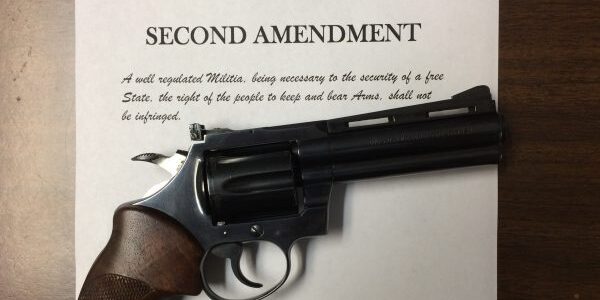
By Dave Workman
Editor-in-Chief
The U.S. Third Circuit Court of Appeals in an 11-4 ruling said Tuesday the federal government cannot ban gun ownership for people convicted of non-violent crimes, a decision which could have huge ramifications.
According to NBC News, the decision by an en banc panel of 15 judges “is the latest defeat for gun control laws in the wake of a U.S. Supreme Court ruling last year expanding gun rights nationwide.”
Writing for the majority, Circuit Judge Thomas Hardiman—a George W. Bush appointee—notes, “At root, the Government’s claim that only ‘law-abiding, responsible citizens’ are protected by the Second Amendment devolves authority to legislators to decide whom to exclude from ‘the people.’ We reject that approach because such ‘extreme deference gives legislatures unreviewable power to manipulate the Second Amendment by choosing a label.’”
The ruling, and the four dissents, may be read here.
The case involves Pennsylvania resident Bryan Range, who was prohibited by federal law from having a firearm because he pleaded guilty to committing welfare fraud in 1995. The NBC report says he obtained more than $2,400 worth of food stamps.
As explained in the ruling, “In 1995, Range pleaded guilty in the Court of Common Pleas of Lancaster County to one count of making a false statement to obtain food stamps in violation of Pennsylvania law. In those days, Range was earning between $9.00 and $9.50 an hour as he and his wife struggled to raise three young children on $300 per week. Range’s wife prepared an application for food stamps that understated Range’s income, which she and Range signed. Though he did not recall reviewing the application, Range accepted full responsibility for the misrepresentation.
“Range was sentenced to three years’ probation,” the narrative continues, “which he completed without incident. He also paid $2,458 in restitution, $288.29 in costs, and a $100 fine. Other than his 1995 conviction, Range’s criminal history is limited to minor traffic and parking infractions and a summary offense for fishing without a license.
“When Range pleaded guilty in 1995,” Judge Hardiman says, “his conviction was classified as a Pennsylvania misdemeanor punishable by up to five years’ imprisonment. That conviction precludes Range from possessing a firearm because federal law generally makes it ‘unlawful for any person. . . who has been convicted in any court, of a crime punishable by imprisonment for a term exceeding one year’ to ‘possess in or affecting commerce, any firearm or ammunition.’”
Range later learned his conviction barred him from possessing firearms or ammunition, so he sued. The government’s position was that, because of his 1995 conviction, he was no longer one of “the people” with Second Amendment rights.
Judge Hardiman’s opinion dispels that contention.
“In sum,” the judge writes, “we reject the Government’s contention that only ‘law-abiding, responsible citizens’ are counted among ‘the people’ protected by the Second Amendment. Heller and its progeny lead us to conclude that Bryan Range remains among ‘the people’ despite his 1995 false statement conviction.
“Having determined that Range is one of ‘the people,’ we turn to the easy question: whether § 922(g)(1) regulates Second Amendment conduct,” Judge Hardiman then states. “It does. Range’s request—to possess a rifle to hunt and a shotgun to defend himself at home—tracks the constitutional right as defined by Heller. (“[T]he Second Amendment extends, prima facie, to all instruments that constitute bearable arms, even those that were not in existence at the time of the founding.”). So ‘the Second Amendment’s plain text covers [Range’s] conduct,’ and ‘the Constitution presumptively protects that conduct.’”
In her dissent, Circuit Judge Cheryl Ann Krause, a Barack Obama appointee, provides a revealing look at how liberals may view each setback to existing gun control laws now that standards established by the Supreme Court in Bruen will apply to Second Amendment cases.
“By confining permissible firearm regulations to the precise measures employed at the Founding,” she observes, “the majority displaces a complex array of interlocking statutes that embody the considered judgments of elected representatives at the federal and state level.”
In other words, an array of gun control laws could be jeopardized by such decisions as this one.



